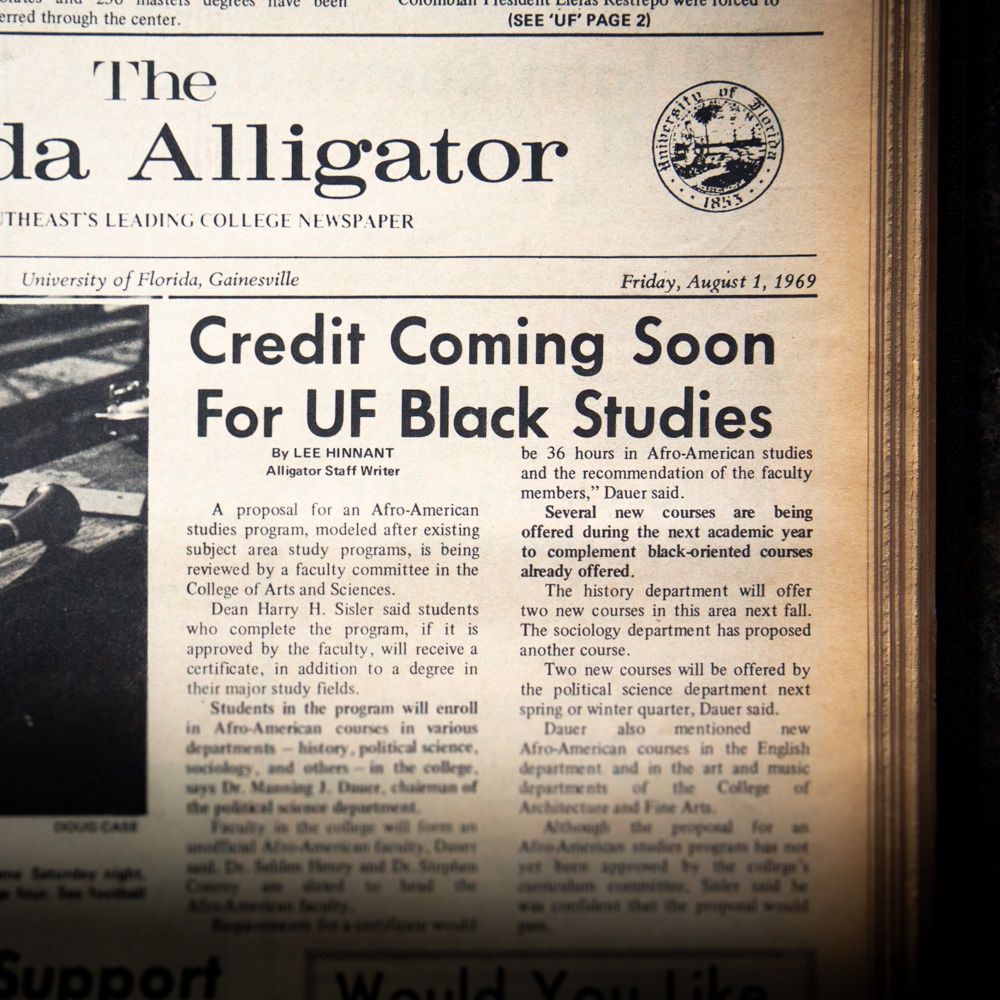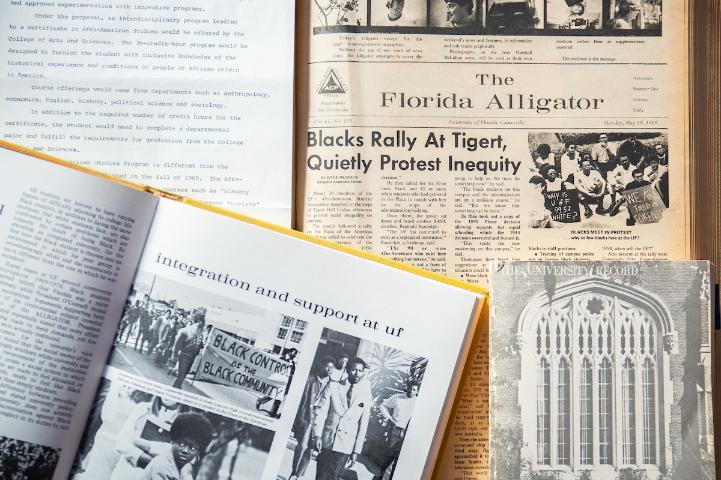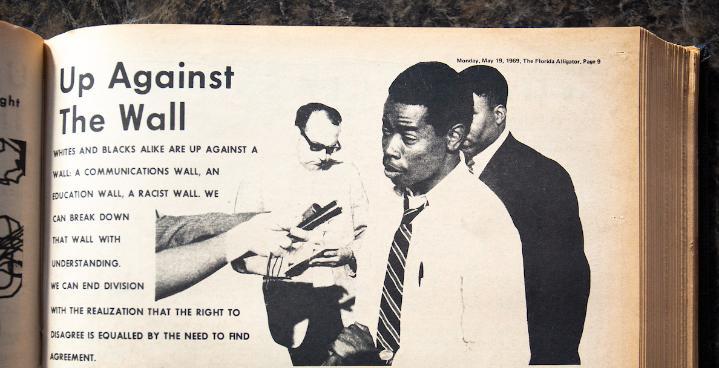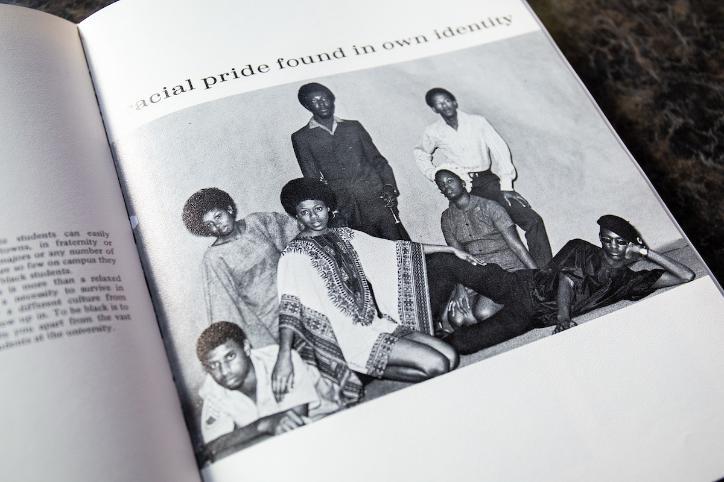
For years, black students at the University of Florida yearned for acceptance and inclusion from faculty and peers. Their demands for resources and representation in curriculum pertaining to ‘Black’ or ‘Afro-American’ Studies increased, and university administrators took note.
In 1969, development of the university’s Black Studies program came to fruition, and its first students enrolled for the Fall 1970 semester. In 1971, the program awarded the first certificate in African American Studies. At the time, faculty consisted of only three African American professors from across campus, one black administrator and 387 Black students enrolled at UF.
Fifty years later in 2019, the College of Liberal Arts and Sciences at the University of Florida is commemorating the golden anniversary of the African American Studies program. In its 50 years, the program has paved the way for students and faculty alike to come together by combining disciplines to build the framework for the future, says the program director, Sharon Austin, professor of political science.
A LOOK TO THE PAST - The beginning of African American Studies at UF
The April 1968 assassination of Dr. Martin Luther King Jr. led to increased participation in civil unrest throughout the United States. African Americans demanded that America make good on promises of democracy and equality, and part of that change demanded was greater access to higher education.
“Towards the Black Power era, you had a number of students, particularly in predominantly white institutions (PWIs), that started to really fight for those institutions to recognize the significance of African American history and culture,” said Ashley Preston, lecturer in the African American Studies program.

In response to the nationwide student activism, San Francisco State University made history by establishing the first Black Studies Department in the nation in 1968. Protests in support of SFSU’s change ensued and strong demands asking for more diverse and inclusive programs available on campus swept the University of Florida, which had become desegregated in 1958. Following in San Francisco State’s footsteps, UF introduced its African American Studies program in the Fall of 1969.
THIS IS NOW - The growth of African American Studies at UF
Today, rising interest in political activism among students is being fueled by an increased visibility of acts of racial discrimination throughout the world and shared through video sharing platforms. Similar in nature to their predecessors, students now are staying politically engaged about current events and want to contribute to a better climate.

“I think that we are in a time period where people are becoming very socially aware, and I think that has driven people to become more interested in African American Studies,” Preston said.
With over 140 undergraduate degrees to major in at the University of Florida, the African American Studies program is one of the fastest growing majors on campus. The degree program provides students with a variety of innovative courses to enroll in, such as Black Women’s Activism, Black Lives Matter and Black Psychology.
In fact, UF’s African American Studies program has the largest number of majors in the country, according to Austin. Most African American Studies programs or departments at peer universities average about 20 students who are majoring, and UF’s program has approximately 82. With a high level of student interest in the courses, the program consistently attracts 500-to-600 students from varying ethnic backgrounds per semester. Students and faculty members from various disciplines are able to come together to teach contemporary subjects with a focus on the African American experience.
“Our students have opportunities to learn from various disciplines, and they’re really able to get a lot out of earning this degree,” Austin said.
Despite gains in the program, black students still remain underrepresented at UF. In 1969, black students made up 1% of the total student body population. According to the latest data available, black enrollment is around 7%. UF Admissions has implemented strategies to engage more diverse student populations in the hopes of increasing interest in African American and minority enrollment.
A LOOK TO THE FUTURE - The future of African American Studies at UF
Through advocacy, socially conscious students have helped shape and define the nature of the African American Studies program at UF now and for future generations.
The dedication to inclusion across campus has been key in the growth of the program, which is in the process of being granted departmental status. This transition is significant. While a program is a collection of courses that lead to a degree or certificate, departments are composed of faculty who are organized for a specific academic department. As the program evolves, it hopes to hire more faculty and expand its focus on African American studies. Recruiting and retaining more black students at UF is also a main goal, according to Austin. She hopes that the growth of the program will appeal to prospective students.
However, the program will need a new director to create a proposal to go before the faculty senate before any change will ensue. Austin will be stepping down from her position as Director of African American Studies at the end of the Spring semester to go on research leave to complete her next book but will remain a UF faculty member. Candidates for the new director are currently being interviewed. The plan is for a new director to be hired later this semester and start by Fall of 2019.
Despite Austin’s departure, African American Studies faculty members have great hopes for the future of the program. The initiation to pursue a transition to becoming a unit is one step forward toward increasing diversity in students, faculty, staff and programs at the University of Florida.

The department is involved in several events this semester:
-Wednesday February 13, a “Women of Color and the Law” panel discussion will take place from at 3 p.m. Attorneys Tiffani Lee, Julie Liang, and Jany Martinez-Ward will discuss their experiences as women of color in the legal profession.
-Friday, February 22, the annual Dr. Ronald Foreman Lecture will take place with a presentation entitled, “Women of the Movement: An Evening with Dr. Stacey Patton and Ms. Lezley McSpadden (Mother of Michael Brown).” This event will take place in the Rion Ballroom of the Reitz Union starting at 6 p.m. For more information on the upcoming events, contact Dr. Austin at polssdw@ufl.edu.